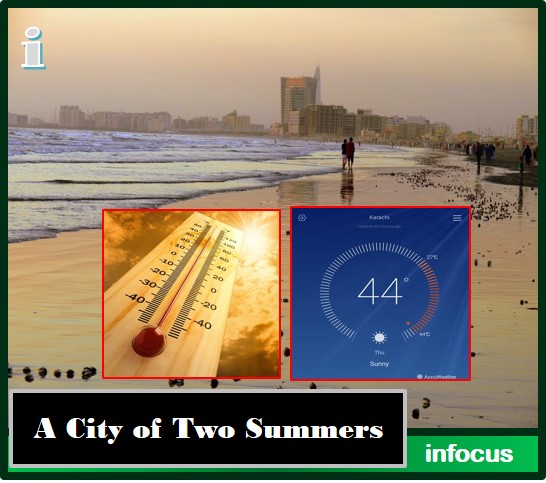
Second summer during the months of September October is a known phenomenon in Karachi. That’s why in the third week of September when the entire country is in the grip of heavy rainfall the residents of the city are confronted with sizzling 41 degree centigrade.
Last year the daytime temperature in Karachi during September also crossed 40 degree Celsius and Pakistan Metrological Department (PMD) issued a five-day heat wave warning due to low pressure in Arabian Sea off the Indian Coast which lessened the sea breeze along the Pakistan coast line. This year the sea breeze again stopped blowing under the influence of a low air pressure formed in the Bay of Bengal.
Due to the changing in weather patterns the monsoon season has passed away this year in Karachi without rainfall. The 2018 was already recorded as the hottest year not only in Karachi and Pakistan but worldwide. However, the consequences of that can be traced more visibly in the megacity of more than 20 million inhabitants. During the first two weeks of September there used to be some good rains in Karachi and thereafter the monsoon completely withdrew from city. However, this year because of without rain the weather has remained largely sunny, drier and with higher humidity, making living, specially outdoor activities, difficult here.
Karachi has long been witnessing its driest monsoon spell since the last two decades with zero millimeters of precipitation recorded by the PMD. The monsoon season in the provincial capital starts from July and lasts till the middle of September and yet no significant rainfall has been recorded till now at the end of the season and prospects of rainfall in October are also very less.
Many consider Karachi as a city of two summers. Pre monsoon summer of April-May and post monsoon summer of September-October. As official data suggests the highest temperature recorded in the city in the month of September was 42.8 degree Celsius recorded on the 30th in 1951.
To control the changes in weather in pattern is a long-time issue and it’s not in the capacity of local or provincial governments. The city needs specific methodology. It’s time to develop a special climate commission for Karachi with specialists of environment, weather, water and horticulture who devise a strategy to cater the ongoing climatic conditions and shape up a better future. One needs to follow the Government of Punjab which has recently initiated a Punjab Clean Air Commission in Lahore and other cities to specifically control pollution and vagaries smog.
Through Punjab Clean Air Commission, various committees have been established at town and district levels for monitoring of measures to control environment pollution. The committees also monitor that the brick kilns remain closed as per court’ orders, ban on crops burning must be followed and a people-friendly strategy for the closure of two-stroke engines, motorcycle rickshaws and smoke emitting vehicles would be sought.
Karachi really needs this kind of strategy, otherwise we are not going to see rain and feel coolness anywhere in the city.

